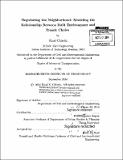| dc.contributor.advisor | P. Christopher Zegras. | en_US |
| dc.contributor.author | Chheda, Rinal (Rinal Komal) | en_US |
| dc.contributor.other | Massachusetts Institute of Technology. Department of Civil and Environmental Engineering. | en_US |
| dc.coverage.spatial | n-us-ma | en_US |
| dc.date.accessioned | 2015-02-25T17:10:56Z | |
| dc.date.available | 2015-02-25T17:10:56Z | |
| dc.date.copyright | 2014 | en_US |
| dc.date.issued | 2014 | en_US |
| dc.identifier.uri | http://hdl.handle.net/1721.1/95572 | |
| dc.description | Thesis: S.M. in Transportation, Massachusetts Institute of Technology, Department of Civil and Environmental Engineering, 2014. | en_US |
| dc.description | Cataloged from PDF version of thesis. | en_US |
| dc.description | Includes bibliographical references (pages 80-84). | en_US |
| dc.description.abstract | This thesis examines the relationship between land use and built environment variables and peoples' mode choice for home-based work trips. Many studies recommend that factors like densification, mixed land use, optimal neighborhood design and proximity to transit can reduce auto-based trips and also decrease the average number of trips per person. From the point of view of city planning, such transit oriented development can guide development, help to contain sprawl, increase economic benefits and has the potential of making cities more sustainable. To understand if the built environment and land use have major impact on an individual's mode choice for work trips, multinomial and nested logit models have been estimated for work trips of people living in the Boston Metropolitn area. The analysis shows that mode choice primarily depends on trip attributes and household characteristics. Built environment factors are secondary for such daily trips. Among transit modes, the built environment and land use factors affect bus and rail modes almost similarly for work trips. Factors of the built environment which are more visible, like high density and a more mixed land use, may increase the likelihood of choosing bus over rail modes by a small amount. | en_US |
| dc.description.statementofresponsibility | by Rinal Chheda. | en_US |
| dc.format.extent | 84 pages | en_US |
| dc.language.iso | eng | en_US |
| dc.publisher | Massachusetts Institute of Technology | en_US |
| dc.rights | M.I.T. theses are protected by copyright. They may be viewed from this source for any purpose, but reproduction or distribution in any format is prohibited without written permission. See provided URL for inquiries about permission. | en_US |
| dc.rights.uri | http://dspace.mit.edu/handle/1721.1/7582 | en_US |
| dc.subject | Civil and Environmental Engineering. | en_US |
| dc.title | Negotiating the neighborhood : modeling the relationship between built environment and transit choice | en_US |
| dc.type | Thesis | en_US |
| dc.description.degree | S.M. in Transportation | en_US |
| dc.contributor.department | Massachusetts Institute of Technology. Department of Civil and Environmental Engineering | |
| dc.identifier.oclc | 903591254 | en_US |
